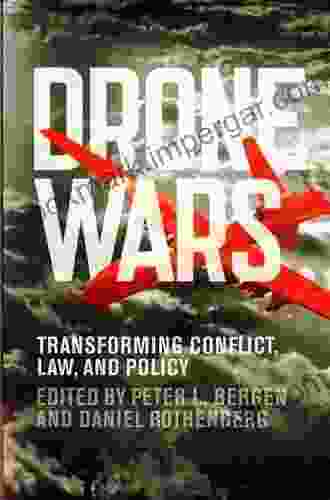The Drone Wars: Transforming Conflict Law and Policy

The use of drones in warfare has become increasingly common in recent years. Drones offer a number of advantages over traditional aircraft, including their ability to operate for long periods of time, their relatively low cost, and their ability to carry out precision strikes. However, the use of drones has also raised a number of legal and ethical questions.
One of the most significant legal questions surrounding the use of drones is whether they are subject to the same laws of war as traditional aircraft. The laws of war are a body of international law that governs the conduct of armed conflict. They prohibit the targeting of civilians, require the use of proportionate force, and mandate the taking of precautions to avoid civilian casualties.
Some argue that drones are not subject to the laws of war because they are not manned aircraft. However, others argue that drones are simply a new type of weapon, and that they should be subject to the same laws as other weapons.
The debate over whether drones are subject to the laws of war is likely to continue for some time. However, it is clear that the use of drones has raised a number of important legal and ethical questions. These questions will need to be addressed in Free Download to ensure that drones are used in a responsible and ethical manner.
The Current State of Conflict Law and Policy on Drones
The current state of conflict law and policy on drones is complex and evolving. There is no single international treaty that governs the use of drones, and different countries have adopted different approaches to regulating their use.
The United States has taken the lead in developing a legal framework for the use of drones. In 2013, the Obama administration issued a Presidential Policy Guidance on the use of drones outside of areas of active hostilities. This guidance sets out a number of principles for the use of drones, including the requirement that strikes must be legal, necessary, and proportionate.
The United States has also entered into a number of bilateral agreements with other countries on the use of drones. These agreements typically set out the conditions under which the United States can operate drones in the other country's airspace.
Other countries have also adopted their own policies on the use of drones. For example, the United Kingdom has developed a policy on the use of drones in self-defense. This policy sets out the circumstances in which the United Kingdom can use drones to strike targets outside of areas of active hostilities.
The use of drones is also governed by international humanitarian law. International humanitarian law is a body of law that protects civilians and other non-combatants during armed conflict. It prohibits the targeting of civilians, requires the use of proportionate force, and mandates the taking of precautions to avoid civilian casualties.
The use of drones raises a number of challenges for international humanitarian law. One challenge is that drones can be used to carry out targeted strikes against individuals. This raises questions about the legality of such strikes, and the extent to which they comply with international humanitarian law.
Another challenge is that drones can be used to carry out surveillance operations. This raises questions about the privacy of individuals, and the extent to which such surveillance complies with international humanitarian law.
The Challenges that the Use of Drones Poses for the Future of Warfare
The use of drones poses a number of challenges for the future of warfare. One challenge is that drones can be used to carry out strikes against individuals without risk to the attacking force. This raises questions about the morality of such strikes, and the extent to which they comply with international law.
Another challenge is that drones can be used to carry out surveillance operations without the need for human interaction. This raises questions about the privacy of individuals, and the extent to which such surveillance complies with international law.
Finally, the use of drones can lead to a decrease in the threshold for the use of force. This is because drones can be used to carry out strikes with a lower risk of casualties than traditional aircraft. This could lead to an increase in the number of armed conflicts, and a decrease in the willingness to resolve conflicts peacefully.
The use of drones in warfare has raised a number of legal and ethical questions. These questions will need to be addressed in Free Download to ensure that drones are used in a responsible and ethical manner.
The use of drones also poses a number of challenges for the future of warfare. These challenges will need to be addressed in Free Download to ensure that drones are used in a way that is consistent with international law and the principles of humanity.
Do you want to contribute by writing guest posts on this blog?
Please contact us and send us a resume of previous articles that you have written.
 Book
Book Novel
Novel Page
Page Chapter
Chapter Text
Text Story
Story Genre
Genre Reader
Reader Library
Library Paperback
Paperback E-book
E-book Magazine
Magazine Newspaper
Newspaper Paragraph
Paragraph Sentence
Sentence Bookmark
Bookmark Shelf
Shelf Glossary
Glossary Bibliography
Bibliography Foreword
Foreword Preface
Preface Synopsis
Synopsis Annotation
Annotation Footnote
Footnote Manuscript
Manuscript Scroll
Scroll Codex
Codex Tome
Tome Bestseller
Bestseller Classics
Classics Library card
Library card Narrative
Narrative Biography
Biography Autobiography
Autobiography Memoir
Memoir Reference
Reference Encyclopedia
Encyclopedia Sivakumar Harinath
Sivakumar Harinath Ian Stewart
Ian Stewart Janet Penn Franks
Janet Penn Franks Maria F Deblassie
Maria F Deblassie J Stewart Black
J Stewart Black Julie Hirschfeld Davis
Julie Hirschfeld Davis Ian Senior
Ian Senior Jacqueline Loss
Jacqueline Loss Jacqueline B Toner
Jacqueline B Toner Nick Summerton
Nick Summerton James R Hansen
James R Hansen Jackie Clay Atkinson
Jackie Clay Atkinson Om Baghele
Om Baghele Jonathan Marshall
Jonathan Marshall Iron Maiden
Iron Maiden Jaclyn Hunt
Jaclyn Hunt Steve Dunwell
Steve Dunwell John K Lambakis
John K Lambakis Susan Greenwood
Susan Greenwood Ron Bates
Ron Bates
Light bulbAdvertise smarter! Our strategic ad space ensures maximum exposure. Reserve your spot today!

 Herb SimmonsUnveiling Tolstoy's Profound Vision of History: An In-depth Exploration in...
Herb SimmonsUnveiling Tolstoy's Profound Vision of History: An In-depth Exploration in... Eliot FosterFollow ·2.3k
Eliot FosterFollow ·2.3k Bernard PowellFollow ·15.3k
Bernard PowellFollow ·15.3k Sean TurnerFollow ·14k
Sean TurnerFollow ·14k Alexander BlairFollow ·13.6k
Alexander BlairFollow ·13.6k Owen SimmonsFollow ·18.9k
Owen SimmonsFollow ·18.9k Herman MelvilleFollow ·12.6k
Herman MelvilleFollow ·12.6k Nathan ReedFollow ·12.7k
Nathan ReedFollow ·12.7k Clark CampbellFollow ·8.4k
Clark CampbellFollow ·8.4k

 Mike Hayes
Mike HayesUnlock Your Nonprofit Potential: A Comprehensive Guide to...
: Embarking on the Path to Impactful...

 Cody Russell
Cody RussellUnlock the Secrets of Captivating Radio Programming:...
In the fiercely competitive world of...

 Aron Cox
Aron CoxUnveiling the Enchanting World of Beth Inspired Eye...
A Realm of Imagination and Wonder Embark on...

 Felix Carter
Felix CarterUnlock the Secrets of Legal Publishing with West Hartford...
West Hartford Legal Publishing, the renowned...

 Henry Hayes
Henry HayesUnveiling the Secrets of the Panama Papers: Exposing...
The Panama Papers is a groundbreaking...












